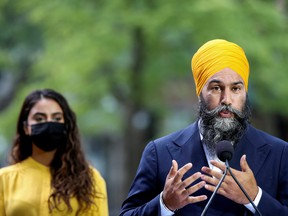Politics
Jagmeet Singh: The essence of a very good politician but attached to a party that can’t win

A recent Angus Reid Institute poll showed Singh was the federal party leader with the highest favourable rating overall. Nearly half the voting population, 46 per cent, said they held a favourable view of the New Democrat leader, and 34 per cent said he would make a good or excellent prime minister. Translating that kind of support directly to votes would make him an actual prime minister. On both of those scores, he significantly leads his rivals, Erin O’Toole and Justin Trudeau.
And yet, he is not likely to win. Rather, he stands to lose quite a bit. Singh himself does not even want this election. He currently props up the government, and wields broad parliamentary influence over its agenda. He has repeatedly called this pandemic summer the wrong time to vote, and has even vainly asked the new Governor General Mary Simon to block it.
Singh was a criminal defence lawyer in Toronto before politics. As a child, he lived in Toronto’s suburb of Scarborough, and in Grand Falls-Windsor and St. John’s in Newfoundland, and in Windsor, Ont.
He ran federally for the NDP in Ontario and narrowly lost in the 2011 election, then won the provincial riding of Bramalea-Gore-Malton barely five months later.
He has cultivated younger audiences through TikTok, such that the name of the platform is sometimes used as an insult against him, signalling callow political silliness. But he has exploited the platform to reach younger voters facing down a socio-economic future that can seem stacked against them, the kind of young people who start voting.
He has called for a tax against pandemic profiteering, and has dismissed the idea of a one-time wealth tax because “the ultra wealthy should always be paying their fair share. And we know that there are a lot of loopholes that mean that the ultra rich don’t pay their fair share at all.”
There has to be a commitment that (any new) infrastructure is made with Canadian products, Canadian steel, Canadian aluminum
Jagmeet Singh
He has promised Buy Canadian measures, without actually saying those two words, which evoke Buy American rules in the U.S. that have led to cross-border trade conflict.
In July, campaigning in Windsor, he said: “Any time we talk about big infrastructure, there has to be a commitment that the infrastructure is made with Canadian products, Canadian steel, Canadian aluminum…. The Liberals have talked about a high-speed train (in Ontario). They’ve never mentioned once that they’re going to use Canadian products in a high-speed train.”
When unmarked graves were found at a Kamloops, B.C., residential school earlier this year, Singh brought forward a non-binding motion calling on the Liberal government to back out of a federal court appeal over a decision by the Canadian Human Rights Tribunal to compensate First Nations children separated from their families in a discriminatory child welfare system.
This was risking the appearance of playing politics at a grossly insensitive time. National Post political columnist John Ivison described it as manipulative and simplistic. But the 271-0 vote left little room for ambiguity about the view of Parliament, even though Trudeau’s cabinet minsters abstained.
Singh did not appear in public with Trudeau. He took a phone call instead. He kept his profile high by keeping it low
Singh has a knack for adroit response to racist outrage. He and Trudeau have been in situations like this before.
One of Singh’s finest moments in the last election was his hasty video response to Trudeau’s blackface scandal, when Singh spoke of standing up for himself in the schoolyard, answering racist taunts with punches, but also of rejecting violence now as grown man, and instead standing up for others with words.
Poorly lit, hurried, unscripted, brutally honest, tough and sensitive, it was the sort of natural political performance that wins people’s trust.
It was risky, too. He had to hold fast against Trudeau’s instincts toward self-aggrandizing performative apology. Everyone could see that was coming. There was a danger that Singh, the only brown candidate, would play the foil to Trudeau’s white protagonist, finding his way through perilous moral territory, learning as he goes.
This time he has an inverse problem. As the third party, Singh’s NDP benefits from a divided electorate. The Liberals may be vulnerable from the left, and the Green Party looks like a shambles to all but the most devoted potential voter. But if left-leaning voters start seeing Conservative fortunes rise and the Liberals weaken, that works against the NDP.
The video was the sort of natural political performance that wins people’s trust
So there was a hint of strategic calculation in Singh’s public statement that he thinks Governor General Mary Simon should refuse the prime minister’s formal request to dissolve Parliament in advance of an election.
“With the COVID-19 pandemic still upon us, and with these important measures still before Parliament, New Democrats have urged the prime minister not to call a snap election,” he wrote in an open letter to Simon. “Should he attempt to request dissolution of Parliament, we think it is important to reiterate that, as you are aware, one does not need to be granted in the absence of a loss of confidence in the House.”
“When Conservatives in the House used every procedural tactic to try and delay, to block, to slow things down, the NDP stood aside and watched,” Trudeau said in response. “They could have stood with us to move forward faster on these important progressive pieces of legislation. They didn’t.”
In that moment, it was Trudeau versus Singh, not Trudeau versus O’Toole. The NDP’s challenge is to maintain that dynamic. For voters who think this is a bad time for an election, this might end up as a point to Singh. Is it playing politics with the GG? Perhaps. Is that anything new? Not really. Does it work? Sometimes.
Politics
Review finds no case for formal probe of Beijing’s activities under elections law

OTTAWA – The federal agency that investigates election infractions found insufficient evidence to support suggestions Beijing wielded undue influence against the Conservatives in the Vancouver area during the 2021 general election.
The Commissioner of Canada Elections’ recently completed review of the lingering issue was tabled Tuesday at a federal inquiry into foreign interference.
The review focused on the unsuccessful campaign of Conservative candidate Kenny Chiu in the riding of Steveston-Richmond East and the party’s larger efforts in the Vancouver area.
It says the evidence uncovered did not trigger the threshold to initiate a formal investigation under the Canada Elections Act.
Investigators therefore recommended that the review be concluded.
A summary of the review results was shared with the Canadian Security Intelligence Service and the RCMP. The review says both agencies indicated the election commissioner’s findings were consistent with their own understanding of the situation.
During the exercise, the commissioner’s investigators met with Chinese Canadian residents of Chiu’s riding and surrounding ones.
They were told of an extensive network of Chinese Canadian associations, businesses and media organizations that offers the diaspora a lifestyle that mirrors that of China in many ways.
“Further, this diaspora has continuing and extensive commercial, social and familial relations with China,” the review says.
Some interviewees reported that this “has created aspects of a parallel society involving many Chinese Canadians in the Lower Mainland area, which includes concerted support, direction and control by individuals from or involved with China’s Vancouver consulate and the United Front Work Department (UFWD) in China.”
Investigators were also made aware of members of three Chinese Canadian associations, as well as others, who were alleged to have used their positions to influence the choice of Chinese Canadian voters during the 2021 election in a direction favourable to the interests of Beijing, the review says.
These efforts were sparked by elements of the Conservative party’s election platform and by actions and statements by Chiu “that were leveraged to bolster claims that both the platform and Chiu were anti-China and were encouraging anti-Chinese discrimination and racism.”
These messages were amplified through repetition in social media, chat groups and posts, as well as in Chinese in online, print and radio media throughout the Vancouver area.
Upon examination, the messages “were found to not be in contravention” of the Canada Elections Act, says the review, citing the Supreme Court of Canada’s position that the concept of uninhibited speech permeates all truly democratic societies and institutions.
The review says the effectiveness of the anti-Conservative, anti-Chiu campaigns was enhanced by circumstances “unique to the Chinese diaspora and the assertive nature of Chinese government interests.”
It notes the election was prefaced by statements from China’s ambassador to Canada and the Vancouver consul general as well as articles published or broadcast in Beijing-controlled Chinese Canadian media entities.
“According to Chinese Canadian interview subjects, this invoked a widespread fear amongst electors, described as a fear of retributive measures from Chinese authorities should a (Conservative) government be elected.”
This included the possibility that Chinese authorities could interfere with travel to and from China, as well as measures being taken against family members or business interests in China, the review says.
“Several Chinese Canadian interview subjects were of the view that Chinese authorities could exercise such retributive measures, and that this fear was most acute with Chinese Canadian electors from mainland China. One said ‘everybody understands’ the need to only say nice things about China.”
However, no interview subject was willing to name electors who were directly affected by the anti-Tory campaign, nor community leaders who claimed to speak on a voter’s behalf.
Several weeks of public inquiry hearings will focus on the capacity of federal agencies to detect, deter and counter foreign meddling.
In other testimony Tuesday, Conservative MP Garnett Genuis told the inquiry that parliamentarians who were targeted by Chinese hackers could have taken immediate protective steps if they had been informed sooner.
It emerged earlier this year that in 2021 some MPs and senators faced cyberattacks from the hackers because of their involvement with the Inter-Parliamentary Alliance on China, which pushes for accountability from Beijing.
In 2022, U.S. authorities apparently informed the Canadian government of the attacks, and it in turn advised parliamentary IT officials — but not individual MPs.
Genuis, a Canadian co-chair of the inter-parliamentary alliance, told the inquiry Tuesday that it remains mysterious to him why he wasn’t informed about the attacks sooner.
Liberal MP John McKay, also a Canadian co-chair of the alliance, said there should be a clear protocol for advising parliamentarians of cyberthreats.
This report by The Canadian Press was first published Sept. 17, 2024.
Politics
NDP beat Conservatives in federal byelection in Winnipeg

WINNIPEG – The federal New Democrats have kept a longtime stronghold in the Elmwood-Transcona riding in Winnipeg.
The NDP’s Leila Dance won a close battle over Conservative candidate Colin Reynolds, and says the community has spoken in favour of priorities such as health care and the cost of living.
Elmwood-Transcona has elected a New Democrat in every election except one since the riding was formed in 1988.
The seat became open after three-term member of Parliament Daniel Blaikie resigned in March to take a job with the Manitoba government.
A political analyst the NDP is likely relieved to have kept the seat in what has been one of their strongest urban areas.
Christopher Adams, an adjunct professor of political studies at the University of Manitoba, says NDP Leader Jagmeet Singh worked hard to keep the seat in a tight race.
“He made a number of visits to Winnipeg, so if they had lost this riding it would have been disastrous for the NDP,” Adams said.
The strong Conservative showing should put wind in that party’s sails, Adams added, as their percentage of the popular vote in Elmwood-Transcona jumped sharply from the 2021 election.
“Even though the Conservatives lost this (byelection), they should walk away from it feeling pretty good.”
Dance told reporters Monday night she wants to focus on issues such as the cost of living while working in Ottawa.
“We used to be able to buy a cart of groceries for a hundred dollars and now it’s two small bags. That is something that will affect everyone in this riding,” Dance said.
Liberal candidate Ian MacIntyre placed a distant third,
This report by The Canadian Press was first published Sept. 16, 2024
The Canadian Press. All rights reserved.
Politics
Trudeau says ‘all sorts of reflections’ for Liberals after loss of second stronghold

OTTAWA – Prime Minister Justin Trudeau say the Liberals have “all sorts of reflections” to make after losing a second stronghold in a byelection in Montreal Monday night.
His comments come as the Liberal cabinet gathers for its first regularly scheduled meeting of the fall sitting of Parliament, which began Monday.
Trudeau’s Liberals were hopeful they could retain the Montreal riding of LaSalle—Émard—Verdun, but those hopes were dashed after the Bloc Québécois won it in an extremely tight three-way race with the NDP.
Louis-Philippe Sauvé, an administrator at the Institute for Research in Contemporary Economics, beat Liberal candidate Laura Palestini by less than 250 votes. The NDP finished about 600 votes back of the winner.
It is the second time in three months that Trudeau’s party lost a stronghold in a byelection. In June, the Conservatives defeated the Liberals narrowly in Toronto-St. Paul’s.
The Liberals won every seat in Toronto and almost every seat on the Island of Montreal in the last election, and losing a seat in both places has laid bare just how low the party has fallen in the polls.
“Obviously, it would have been nicer to be able to win and hold (the Montreal riding), but there’s more work to do and we’re going to stay focused on doing it,” Trudeau told reporters ahead of this morning’s cabinet meeting.
When asked what went wrong for his party, Trudeau responded “I think there’s all sorts of reflections to take on that.”
In French, he would not say if this result puts his leadership in question, instead saying his team has lots of work to do.
Bloc leader Yves-François Blanchet will hold a press conference this morning, but has already said the results are significant for his party.
“The victory is historic and all of Quebec will speak with a stronger voice in Ottawa,” Blanchet wrote on X, shortly after the winner was declared.
NDP Leader Jagmeet Singh and his party had hoped to ride to a win in Montreal on the popularity of their candidate, city councillor Craig Sauvé, and use it to further their goal of replacing the Liberals as the chief alternative to the Conservatives.
The NDP did hold on to a seat in Winnipeg in a tight race with the Conservatives, but the results in Elmwood-Transcona Monday were far tighter than in the last several elections. NDP candidate Leila Dance defeated Conservative Colin Reynolds by about 1,200 votes.
Singh called it a “big victory.”
“Our movement is growing — and we’re going to keep working for Canadians and building that movement to stop Conservative cuts before they start,” he said on social media.
“Big corporations have had their governments. It’s the people’s time.”
New Democrats recently pulled out of their political pact with the government in a bid to distance themselves from the Liberals, making the prospects of a snap election far more likely.
Trudeau attempted to calm his caucus at their fall retreat in Nanaimo, B.C, last week, and brought former Bank of Canada governor Mark Carney on as an economic adviser in a bid to shore up some credibility with voters.
The latest byelection loss will put more pressure on him as leader, with many polls suggesting voter anger is more directed at Trudeau himself than at Liberal policies.
This report by The Canadian Press was first published Sept. 17, 2024.
The Canadian Press. All rights reserved.
-

 Sports17 hours ago
Sports17 hours agoEdler to sign one-day contract to retire as a Vancouver Canuck
-

 Sports24 hours ago
Sports24 hours agoSixth-ranked Canadian women to face World Cup champion Spain in October friendly
-

 News24 hours ago
News24 hours agoReport charts path for Canada to show importance to United States
-

 News17 hours ago
News17 hours agoBillie Jean King set to earn another honor with the Congressional Gold Medal
-

 News17 hours ago
News17 hours agoAccount tweaks for young Instagram users ‘minimum’ expected by B.C., David Eby says
-

 Politics22 hours ago
Politics22 hours agoReview finds no case for formal probe of Beijing’s activities under elections law
-

 News2 hours ago
News2 hours agoCanada’s Hughes may be what International team has been missing at Presidents Cup
-

 News24 hours ago
News24 hours agoSurrey, B.C., ER doctors call for ‘new leadership’ amid ‘toxic’ work environment




























